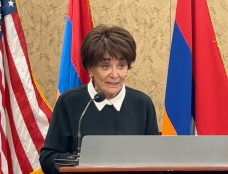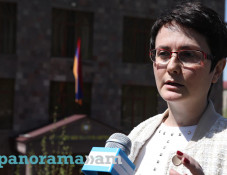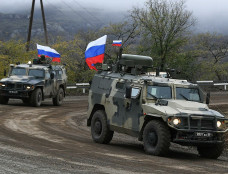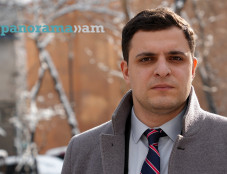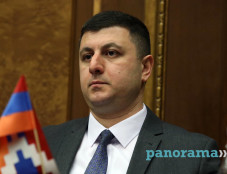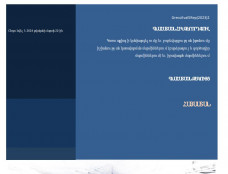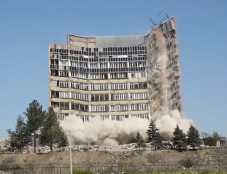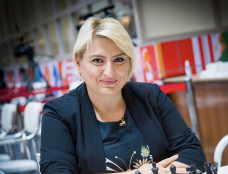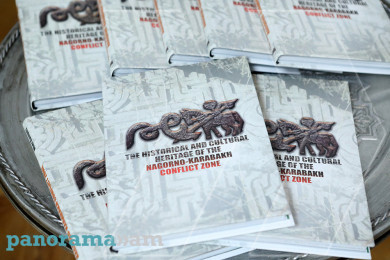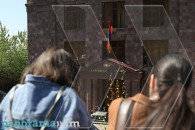
Scientific publication: Azerbaijan Tatar children played in manure, women’s untidiness became proverb
In the 20th issue for the year 1894 of the project “Collection of Materials to Describe the Terrain and Tribes in the Caucasus,” the teacher and supervisor of the Batumi vocational school, A. Zakharov, published an article about the domestic and social life of the Tatar women in Azerbaijan, their family structure and particularly the upbringing of the children.
In Tatar families, having many children was an obligatory attribute of a successful family, which increased the woman’s status in the eyes of other women. The pregnant Tatar villagers did not cease working to the last moment, and the labor pains often started in the garden, in the field, while working. The women round there helped the pregnant woman to deliver the child behind a bush under the open sky. After the childbirth, she wrapped the newborn in a piece of rag, and went on working to go back home on foot late in the evening.
Once the author witnessed a woman fall behind the migrating carts, enter a forest nearby and catch up with her string of carts a few hours later with a newborn baby in her hands. “That case is something ordinary. No one in the line of carts was concerned but for several women wondering whether Allah had sent her a boy or a girl. The only attention she got was that she was seated on the back of a saddled ox,” writes the author. What shocked him most, was the extreme coldness of the newborn’s father: he did not come up to his wife for a single time, nor did he ask how she felt. He only drove the thick cow with an unceasing yelling.
However, according to Zakharov, a settled Tatar in childbirth was in a much worse situation, as she had to deliver under her husband’s roof. “A Tatar’s home was extremely poor. It was an underground hole, which could be recognized only due to the air holes and the low door. The urban Tatars live in hovels built of raw brick and rustic stone – nothing better than the underground holes,” he writes, adding that they “stank unimaginably and were untidy.” In rainy weather, there was as much dirt inside as there was outside.
In winter, the Tatars drove all the domestic animals, cows, sheep, goats, into their dwelling place, and the whole family – irrespective of age and gender – slept on the floor under one blanket with the livestock. They cooked their food and baked the bread in that very place. And the Tatar woman had her childbirth there, in that environment. “Her painful cries fused with the rasping sound of saz, the nickering of horses and mooing of cows,” Zakharov writes.
He describes a scene he witnessed entering a Tatar’s house to avoid rain. “Several pieces of firewood smoldered in the middle of the hut filling the place with caustic smoke, which damaged the eyes. Naked children were asleep wallowing on the floor around the fire. Two men talked calmly, as one of them was stretching on his belly smoking a pipe, and the other, squatting, was looking diligently for parasites in the folds of his papakha. Suddenly, I heard piteous moans from the dark corner of the hut. I looked questioningly at the Tatar, the one who stretched by the fire. However, he went on smoking coldly his pipe. ‘Womanly affair,’ he said through clenched teeth waving his hand indifferently,” he writes.
Another significant feature the Tatar women had was that they never asked for a midwife no matter how difficult the labor was. They preferred to deliver the child on their own or with the help of a cannie wife from their surroundings. “The Tatars had an absurd belief that the midwives killed the newborns not to let the believers breed. The Tatar women also thought it a shame to call a doctor,” Zakharov writes claiming that the ignorant cannie wives had significantly contributed to the spread of the rumor in order not to lose their job.
The author recalls a case he witnessed and participated. Her Tatar neighbor was dying in childbirth in Shemakh. Aware that sometimes women died because of “minor reasons” yet beware of sending for a doctor, he sent for a city midwife. However, when she arrived, the women started to shout and protest. They locked the door and did not want to let her to the mother in labor. Taking advantage of the respect he enjoyed in the place due to his uniform cap, Zakharov sternly ordered them to open the door. As the door opened, he witnessed the following scene: the parturient woman was lying in a dead faint on the earthen floor completely nude and in blood. A woman was pulling her hair, her ears, pinching and tweaking her; another woman was pouring cold water on her head and belly from a jug. A dirty puddle was formed around her on the ground. When the midwife went up to her, the women again started whining and shouting. However, the parturient soon regained consciousness thanks to the midwife’s efforts. Still, the Tatars preferred to attribute that miracle to the talisman, which they used in such cases and piously believed in its power.
The Tatars did not conceal their happiness at a boy’s birth, while a girl’s death raised their discontent for the boy was “the master of the hearth” while the girl was considered “someone else’s ware.” People congratulated the parents on a boy’s birth saying, “Allah sent you a great joy. Blessed be His name.” When a girl was born, no one congratulated the parents, but only consoled them with the words, “Do not lose your heart. Allah will send you a boy, too.”
While a Tatar villager considered the woman to be workstock, for a city Tatar she was an object for sensual pleasures. The peculiar perceptions of a girl’s meaning conditioned the sharp difference of the upbringing of a boy and a girl. “The relatives and acquaintances surrounded the boy’s cradle using their skills to save his life from all sorts of accidents, like an evil eye or diseases. They decorated his cradle with talismans and amulets. Meanwhile a girl was left on her own,” the author writes.
According to Zakharov, the gender distinction between the children found its reflection also in the Tatars’ lullabies. The boy was represented as a “pillar of the family,” as “his mother’s hope” and “father’s pride” in the lullabies, which painted a bright future for the boy. The girl, on the contrary, was referred to as “father’s grief and shame of the family” with a gloomy future.
The author further writes about the parents’ attitude towards their children in general, starting from the infancy. The greatest part of the day the baby remained tied up tightly with ribbons in the cradle without being able to move legs or hands. “If the baby starts crying, the mother beats it in the cradle to make it calm down. But that method results in a totally opposite outcome as the baby starts sceaming even louder. Finally, the Tatar mother gives the baby milk with opium or poppy juice to calm it down, thus paralyzing the baby’s brain since very childhood,” he writes.
Zakharov describes the Tatar woman as a loving mother. However, the maternal love was expressed in outbursts – in one case, she would press the baby to her breast in a wild passion, covering it with her kisses, and in another case, she would totally forget about its needs. Once the baby started crawling, it was left on its own. It would crawl on the floor for hours, picking up crumbs of bread or bones and pushing everything into the mouth. Going out for the whole day, the mother left the child sleeping on the floor without anyone watching them. Waking up, the baby started screaming and crying until tiring itself out or losing its voice. Sometimes it would hit on a sharp object and hurt itself or fall into a hole getting an injury while crawling across the floor in search of its mother
“I very often saw men and women in Tatar villages who were maimed or had dreadful burns. Every time I asked what happened I was told that as a child, they had fallen into a hole or into the tonir,” the author writes pointing out that if the Tatars were so negligent about their children in general, how hard it would be for a girl, who did not get attention at all.
A girl’s death – irrespective of the reason – was some sort of a relief for her parents as they were getting rid of an extra burden. “This can be observed in the way they mourned for the loss of a boy and a girl. In the first case, the mother scratches her face and breast, tears her hair out, etc. While in case a girl dies, she will pour a few tears at best. ‘Glory be to Allah that we lost our girl rather than our boy,’ with these words the Tatar parents would console themselves,” he recounts.
A Tatar father found it a humiliation for himself to deal with the children’s upbringing. He would never take his child in his hands and caress him, let alone kissing. Even if he saw his child in danger, he would not go up to him, would not help him at least out of decency. He would only call his wife shouting and swearing at her heavily.
“In Tatar villages, one can often see a Tatar man stretching on his back on a pile of manure and smoking with pleasure bitter tobacco, while his child is crying and overstraining himself just a few steps away from him. He will not even turn to look at him or wonder why he is crying,” the author writes. He notes that the city Tatars had a similar attitude to their children. If the doors were unlocked, a child would go out and get lost. One could often see crying children in the streets of the city, who knew neither who their parents were nor where their home was.
The Tatar women’s untidiness became a proverb, according to Zakharov. They considered it a completely unnecessary task to take care of their children’s neatness. They never gave their children a bath, and seldom washed them. The whole body of the majority of the rural children was covered with a thick layer of dirt. A lot of totally naked, dirty children, boys and girls, could be seen on a pile of manure or around dirty puddles in the village any time of the year.
According to the author, the urban Tatar women were not much better than the rural ones. “Even the richest parents’ children’s head, face and body are covered with rashes and eschars. In Shemakhi school, 24 out of the 59 pupils suffered from skin diseases. And among the rest, there was no one without traces of ulcers or rashes on the face and head,” he writes.
He further writes in regret that the Tatar parents taught their children to beg since very young age. “So many times, stopping at a Tatar villager’s place, I would witness the mother, at my presence, force her children come up to me and ask for handouts. They do not want to, they cry, but the mother would claim, ‘don’t be afraid, the friend will give you handouts’ or ‘the friend will give you tea and sugar.’ She will not calm down until she gets something from the ‘friend’,” Zakharov writes.
As for the gender inequality, author notes with sorrow that it was cultivated from the early years. From the very childhood, the boy got used to despising his sisters and other girl-children – he knew that he was incomparably worthier for his parents than his sisters were. In games, the boys’ arrogance and despotic treatment with the girls was overlooked. He tortured and beat them, while the girl knew she had no right to respond to the attacks – she was aware of her helplessness, and that he was a boy and she was a girl.
She bore her brother’s attacks with an “amazing patience,” she neither complained, nor scolded him. ‘A girl’s tongue will dry up if she complains of her brother,’ a Tatar proverb says. In contrast with the sister’s devotion, the bother was ashamed for her.
The girl was a scapegoat in the games. She either was harnessed to a cart and beaten with sticks, or made a target for arrows. At the end of the game, the girl was always crying, and it would be even worse for her if she decided to go to the adults and complain of his brothers. She would be punished both by the former and the latter, Zakharov writes.
He recalls how he gave a tin whistle to a rural boy. The episode remarkably illustrates the morals the Tatar society cultivated in the children since their early years. “He first looked at me with some distrust, as if doubting in my sincerity. Then he quickly seized my gift and ran away. After getting to a fair distance, he stopped and started to swear at me with the most indecent words.”
To be continued.
The “Collection of Materials to Describe the Terrain and Tribes in the Caucasus” is a large-scale publication of narrative sources carried out by the management of the Caucasus Educational Okrug in 1881-1908. It includes researches and description of the history, life, and ethnographic characteristics of the peoples inhabiting the Caucasus region of the Russian Empire.
Related:
Scientific edition of Russian Empire: Armenian witnesses about Erivan Fortress capture
19th century scientific edition of Russian Empire compiled historical data about ancient Erivan
Scientific publication about village Vartashen and Udis, Armenians, Jews and Tatars living there
Newsfeed
Videos






